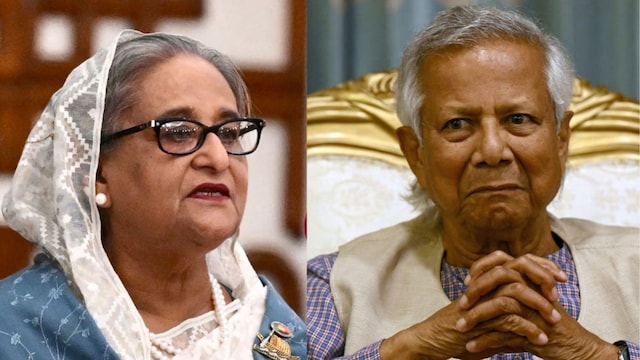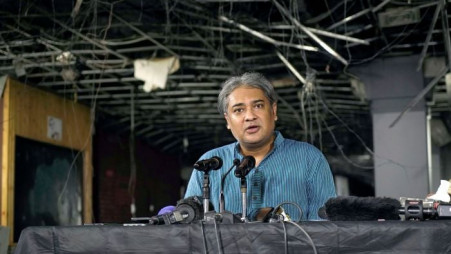An investigation by the BBC World Service, in collaboration with BBC Bangla, has revealed details of a police-led massacre in Dhaka’s Jatrabari on August 5 and claimed that on July 18, Prime Minister Sheikh Hasina authorised security forces to “use lethal weapons” against demonstrators.
The Awami League and independent journalists have condemned the report as biased and incomplete, which aims at demonising the former government and the police force. The report hides the fact that anarchists had targeted the police, aimed at the government’s ouster, and dubbed a student-led movement against discrimination!
Neither the BBC nor any Bangladeshi media have dared to report the planned attack and murder of police members at Jatrabari on July 18-20 and August 4-5 but have continued to highlight the other side of the story.
The BBC should have shown neutrality, at least when the killers were admitting the meticulously designed murders and arson in public and evidence of armed killers having control of the protests, say the activists.
According to the BBC report, on August 5, in the Jatrabari area of Dhaka, the investigation found that at least 52 people were killed by police. Initial reports at the time suggested 30 dead in Jatrabari on that day.
For more than half an hour, police fired at fleeing demonstrators attempting to escape through alleyways and onto highways. Officers later retreated to a nearby army camp.
Yunus is using database to crush Awami League, says Sheikh Hasina
AL is blamed for mass killings, but Yunus Gang admitted it already
Protesters retaliated hours later, killing at least six police officers and setting fire to the Jatrabari police station, the BBC said.
Awami League President and five-time Prime Minister Sheikh Hasina has blamed the illegal chief adviser and mob king, Muhammad Yunus, for the systematic killings during July-August to unseat her and attempting to assassinate her on August 5.

In a virtual speech, she noted that the anti-quota movement remained peaceful until July 15, but thereafter, protesters began attacking police, torching government buildings, and blocking roads. They targeted both police and military personnel, who have the right to self-defense. Her government took necessary actions to protect lives and property. “We did nothing wrong.”
She said Yunus and The Daily Star editor Mahfuz Anam attempted to form a political party with Western support in 2007 and prepared a list of 70 people, a plan that failed due to a lack of public support. So, they conspired to disrupt elections in 2014, 2018, and 2024 but were unsuccessful.
Arafat pinpoints the flaws
Mohammad A Arafat, former state minister for information, in a post on X, said that the BBC Eye documentary leaves out critical context and omits key facts that are essential to understanding the events it attempts to portray. What’s presented is a selective narrative that, intentionally or not, distorts the reality on the ground.
He said the voice recording attributed to Prime Minister Sheikh Hasina is neither verified nor, even if authentic, does it indicate culpability or unlawful instructions. BBC did not release the full audio or the context of her statement.
ICT-BD: Prosecution failed to provide evidence of genocide, says state defense
“If the instruction was directed against armed perpetrators, prison-break instigators, or terrorists attacking state institutions, then it falls squarely within the legal use of force under Bangladeshi law. Law enforcement is permitted, indeed expected, to use lethal force in defense of themselves, civilians, and critical infrastructure.

“In fact, the government had EXPLICITLY barred lethal force until July 18. If there was any lifting of that bar, it was likely to restore control and allow law enforcement to defend themselves and civilians—not to unlawfully target protestors.”
He added that contrary to what the BBC Eye tries to suggest in its documentary, it has no “smoking gun” against Sheikh Hasina.
“The recording they reference doesn’t mean she was ordering executions. That’s an incorrect interpretation. In fact, the same audio also mentions an order to arrest them. It’s clear, even if this audio is authentic, two distinct instructions were given for different scenarios and aimed at different groups.”
Arafat said that the ruthless murders and hanging of two police officers on the overbridge earlier demonstrated that the terrorists posed a threat to the lives of law enforcement. Therefore, in order to exercise the right to private defense, law enforcement had all the legal authority to apprehend individuals responsible and, if needed, employ lethal weapons.
“BBC isolates a single sentence and imposes its own interpretation, without presenting the full context.”
He pointed out that the documentary never asks the obvious: why was a massive crowd advancing toward the Jatrabari police station at all?
According to the BBC, protestors were celebrating rumours that Prime Minister Sheikh Hasina had resigned. But that hardly justifies laying siege to a police station, especially when officers had already retreated inside and the army had taken position outside to prevent escalation.
Just a day before the Jatrabari incident, 15-17 officers were brutally killed in Enayetpur police station in Sirajganj. They were slaughtered with sharp weapons; their bodies were left hanging from trees, while some were burned.
Arafat questioned why this incident was not even mentioned in the documentary. “Why? It’s entirely reasonable that police inside Jatrabari feared a similar outcome.”
Fact-check: How Yunus lies about his complicity in July Conspiracy
Fact-check: Legitimacy of Yunus government in question
He said the BBC completely sidesteps the fact that, immediately after the collapse of the government, police stations across the country were attacked in a coordinated manner with a central command. “Terrorists embedded in the mob killed dozens of officers, looted 6,000 weapons, and over 600,000 rounds of ammunition. The officers at Jatrabari must have had real-time reports of this unfolding carnage. They had every reason to believe they were next.”
Scrutinising the footage, Arafat said it clearly shows that police fired only after the army personnel withdrew and individuals began storming the station. Calls of “come inside” are visible, and people can be seen rushing toward the gate.
By the time the police shooting started, Prime Minister Sheikh Hasina was reportedly on her way out of the country. The chain of command within the police had collapsed. One officer interviewed admits they received no help despite repeated calls to headquarters. The officers were forced to act independently, likely under panic, stress, and uncertainty, without orders, reinforcements, or backup.
“In light of the collapse of the government, the idea that officers received superior command to indiscriminately kill people is not only implausible, it’s unsupported by any real evidence. Officers acted on instinct and self-preservation, however imperfectly.”
Report: 123 Awami League members killed since August 5
Meticulous design: Mahfuj Alam reveals July conspiracy, defends mobs
Arafat continued that throughout the protests, officers were picked off whenever isolated or unprotected. In Jatrabari itself, near the very station in question, two plainclothes officers were dragged out, lynched, and hanged upside down from an overpass on July 19 and 20.
They were off duty, identified only because their ID cards and uniforms were found in their bags. The BBC vaguely refers to police “violence” in the area but skips over these police killings completely.
The BBC portrayed Jatrabari as a critical entry point to Dhaka and a hub of students and labourers. What the BBC fails to mention is what the area is most known for: a dense concentration of hundreds of madrasas, including the institutions that produced several of the so-called “masterminds” and leaders of this meticulous protest. These madrasa compounds sheltered thousands of extremists who organised and launched attacks from within, Arafat added.